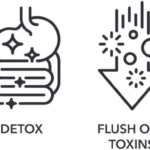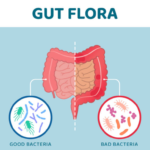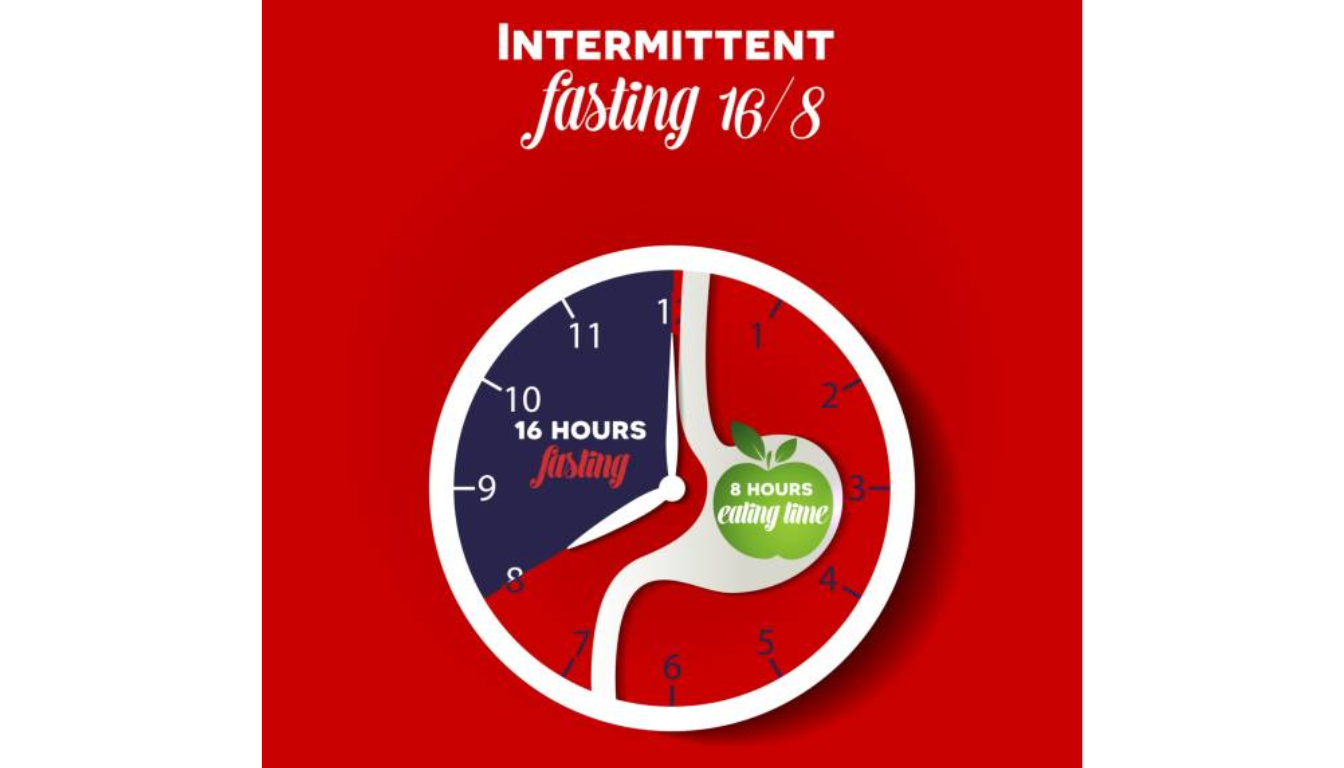
How Does Intermittent Fasting Impact Gut Health?
Have you ever wondered about the relationship between intermittent fasting and gut health? When I began intermittent fasting to lose weight, I discovered a surprising benefit—it significantly impacts gut health.
Intermittent fasting not only transformed my eating habits but also highlighted its profound effects on gut bacteria. I was surprised to learn that during fasting, the body cleans out damaged cells, which in turn promotes better gut health.
Key Takeaways
- Intermittent fasting can significantly alter gut microbiome composition, increasing microbial diversity.
- Beneficial bacteria, such as Lachnospiraceae, thrive during fasting, providing metabolic and health-span benefits.
- Prolonged fasting periods offer more opportunities for gut microbiota recovery compared to those during the natural sleep-wake cycle.
- Intermittent fasting has been linked to improved cardiometabolic health and reduced risk factors for metabolic syndrome.
- Fasting supports bacteriogenesis in the gut, contributing to enhanced metabolic health and longevity.
- Studies show intermittent fasting positively affects human gut microbial diversity and blood lipid profiles.
- The practice is a helpful tool in obesity management through beneficial interactions with the gut microbiota.
Understanding Intermittent Fasting and Gut Health
What is Intermittent Fasting, and How Does It Support Gut Health?
Intermittent fasting means eating and fasting in cycles. It uses your body’s fasting state to boost health. A common type is time-restricted eating. You eat all your food at a set time each day. For example, with the 16/8 method, you fast for 16 hours and eat in an 8-hour window. Studies show that it can raise levels of good bacteria that might lower the risk of cancer and heart disease.
Popular Types of Intermittent Fasting for Gut Health
There are many intermittent fasting methods, each with its advantages:
- Time-Restricted Eating: Methods like 14/10, 16/8, and 20/4 are popular. The 16/8 method can improve your gut health and help combat obesity.
- 5:2 Fasting: Eat normally for five days, then consume minimal calories (500-800) for two days. This might strengthen the gut barrier and reduce long-term inflammation linked to chronic diseases.
- Alternate-Day Fasting: Switch between days of normal eating and days of less food. This method can help you lose weight while positively affecting your gut bacteria.
The Gut Microbiome: How It Relates to Intermittent Fasting and Gut Health
What is the Gut Microbiome?
Factors Affecting Gut Health
Many things impact our gut health, such as diet, stress, sleep, and physical activity. These factors shape the gut microbiota and its diversity. Let’s explore how they influence our gut health.
- Diet: Diet plays a significant role in our gut health. Eating fiber-rich fruits and veggies supports good bacteria. In contrast, excessive fat and sugar can disrupt this balance.
- Stress: Constant stress can hurt our gut by helping harmful bacteria grow and reducing good ones.
- Sleep: Good sleep is vital for a healthy gut. Bad sleep can lead to less variety in our microbiome, affecting our health.
- Exercise: Staying active boosts the variety of microbes in our gut, leading to a healthier microbiome.
Understanding the gut microbiome and its effects is critical to our health. Fasting, for example, can change our gut bacteria in exciting ways. During Ramadan, certain bacterial types decrease while others increase. These changes highlight how our diet affects gut health.
| Bacterial Genera | Changes with Fasting | Significance |
|---|---|---|
| Firmicutes | Decreased | p |
| Proteobacteria | Increased | p |
| Blautia, Coprococcus, Dorea | Decreased | p |
| Escherichia, Shigella | Increased | N/A |
How Intermittent Fasting Affects Gut Health
Starting intermittent fasting can significantly improve your gut health. We’ll examine how it improves microbial diversity and strengthens the gut barrier. Understanding this will help you understand the benefits of adding intermittent fasting to your lifestyle.
Changes in Microbial Diversity
Intermittent fasting boosts microbial diversity. It helps grow good bacteria like Akkermansia muciniphila and Bacteroides fragilis, as seen during Ramadan. Having more varied microbes can reduce inflammation and improve health.
A diverse set of microbes can also lower the risk of diseases like diabetes and cancer. Intermittent fasting changes the gut’s microbial makeup by reacting to eating or fasting patterns. This keeps the gut from entering a starvation mode that can lessen bacterial diversity.
Impact on Gut Barrier Function
The gut barrier plays a vital role in preventing harmful germs and substances from entering the body. In addition, intermittent fasting supports the repair of the gut lining by prolonging the fasting period beyond sleep, giving the body extra time to heal. As a result, this extended healing period can help reduce chronic inflammation, which is often linked to conditions like Crohn’s disease.
Moreover, intermittent fasting strengthens the gut barrier, limiting the absorption of harmful bacterial toxins. This can significantly improve metabolic health. Fasting also helps reduce inflammation, addressing issues such as obesity and blood sugar imbalances, ultimately leading to a healthier gut and overall well-being.
Here’s a brief overview of how different fasting methods impact gut health:
| Fasting Regimen | Duration | Impact on Gut Health |
|---|---|---|
| 16:8 | 16 hours fasting, 8 hours eating | Supports microbial diversity and gut barrier protection |
| 5:2 | Fast for 2 days, eat normally for 5 days | Reduces systemic inflammation and improves metabolic health |
| Alternate-Day Fasting | Every other day, fasting | Enhances immune health and reduces chronic inflammation |
Overall, intermittent fasting improves gut health by increasing microbial diversity and strengthening the gut barrier. It also has anti-inflammatory effects, laying a solid foundation for better health.
Intermittent Fasting Gut Health
Intermittent fasting is widely recognized for improving gut health. In fact, nearly 12% of American adults choose it as their diet. Moreover, it’s known for its positive impact on fasting for digestive health and microbiome modulation. For instance, time-restricted eating, such as fasting for 12 to 16 hours, can improve gut bacteria.

Studies on mice show that fasting affects males and females differently. In females, it has been shown to improve small intestine health dramatically. Men see more benefits in blood sugar control. Yet, both benefit from fasting overall. The 5:2 fasting method, which means eating less for two days and generally for five days, helps with blood sugar and reduces inflammation.
Intermittent Fasting Pattern
| Intermittent Fasting Pattern | Benefits Observed |
|---|---|
| Time-Restrictive Eating | Improved gut microbiota, reduced inflammation |
| 5:2 Method | Better glucose levels, reduced inflammation |
One study shows how intermittent fasting impacts nutrient intake and gut health. People on the fasting-protein plan cut down fats, carbs, and sugar by 40%. This change led to notable microbiome modulation and more fiber in their diet. They also lost weight and saw more enormous shifts in gut bacteria than those on continuous diets.
Intermittent fasting also helps gain muscle without fat and eases stomach issues. Those following it had fewer gastrointestinal problems. They also saw a rise in beneficial microbes and substances that burn fat. On the other hand, people on continuous diets saw benefits for aging.
“The IF-P regimen was significantly more effective in modulating the gut microbiome and reducing gastrointestinal symptoms compared to traditional continuous caloric restriction.”
Overall, intermittent fasting is a solid way to improve gut bacteria and digestion. Pairing it with a balanced diet offers many health benefits. It’s a viable option for adults wanting a healthier lifestyle.
Practical Tips for Improving Gut Health During Intermittent Fasting
Keeping a healthy gut with intermittent fasting can be challenging. Yet, the right strategies make it easy to improve your gut health. Here are some tips to help enhance your healthy diet while fasting.
Incorporate Probiotic-Rich Foods
Eating fermented foods such as yogurt, kefir, kimchi, and kombucha is a game-changer. These foods are loaded with probiotics. They add good bacteria to your gut, keeping it healthy and supporting digestion.
Focus on Plant-Based Foods
Avoid Ultra-Processed Foods
Reduce your intake of ultra-processed foods. They’re bad for your gut and can cause health problems. These foods mess with your gut bacteria and can lead to digestive issues. Choose whole, nutrient-rich foods for a healthier gut instead.
| Food Type | Benefits for Gut Health |
|---|---|
| Fermented Foods | Introduce beneficial bacteria |
| Plant-Based Foods | Provide dietary fibers that nourish gut bacteria |
| Whole Foods | Support a balanced gut microbiome |
Customizing your diet to your gut’s unique needs can further improve your health while fasting. At-home tests can help you figure out what your gut needs. This way, you make diet choices that strengthen and diversify your gut microbiome.
Conclusion
Intermittent fasting has been gaining popularity for its positive effects on gut health. Studies show it helps increase the variety of gut bacteria and strengthens the gut. This has been noted in research by Harvie et al. (2011) and Brandhorst et al. (2015). They found that fasting with a well-rounded diet boosts gut health.
The perks of intermittent fasting are impressive. It can enhance beneficial bacteria and lessen harmful ones in the gut. This not only aids gut health but also improves brain function, slows down aging, and lowers inflammation. Research by Wei et al. (2017) and Davis et al. (2016) supports these findings.
The link between diet, fasting, and gut health is complex but critical to personalized health plans. People react differently to intermittent fasting, which shows why it’s vital to customize diet plans for the best health outcomes. Consulting with health experts and adjusting one’s diet and lifestyle can maximize the benefits of intermittent fasting, promoting better gut health and overall well-being.
FAQ
Q: What is intermittent fasting?
A: Intermittent fasting is a plan where you eat and drink at certain times. It typically ranges from fifteen to eighteen hours of not eating. It pays more attention to when you eat, allowing you to eat needed calories and nutrients at a set time.
Q: What are the popular types of intermittent fasting?
A: There are several types of intermittent fasting. The 16/8 method involves eating for eight hours and then fasting for sixteen. Another type is the 5:2 approach, where you eat normally for five days and cut back on calories for two days. Alternate-day fasting is where you switch between regular eating and fewer calories.
Q: What is the gut microbiome?
A: The gut microbiome is made of trillions of bacteria and microorganisms in our guts. They are vital for digesting food, metabolism, and keeping our immune system strong.
Q: What factors affect gut health?
A: Many things impact gut health, including what we eat, stress, sleep, and physical activity. Diet, significantly, can quickly alter gut bacteria’s function and makeup.
Q: How does intermittent fasting impact gut health?
A: Intermittent fasting can improve gut health by diversifying microbiota. It boosts the growth of good bacteria like Lachnospiraceae and Bacteroidetes, which may reduce disease risks, improve metabolism, and help the gut wall stay strong.
Q: How does fasting influence microbial diversity?
A: Fasting boosts the variety of microbes in the gut. This helps maintain a healthy and balanced gut environment.
Q: What is the impact of intermittent fasting on gut barrier function?
A: Intermittent fasting strengthens the gut wall, preventing harmful pathogens. It also helps lower long-term inflammation, which can cause health problems.
Q: How can I improve gut health during intermittent fasting?
A: To improve gut health during fasting, include probiotic-rich foods such as yogurt, kefir, kimchi, and kombucha in your diet. Add a variety of plant-based foods to get prebiotics, and steer clear of highly processed foods. This helps maintain a healthy gut microbiome.
Source Links
Systematic Reviews and Meta-Analyses
Research Articles on Intermittent Fasting and Gut Health
- Fasting alters the gut microbiome, reducing blood pressure and body weight in metabolic syndrome patients – Nature Communications
- Gut microbiome remodeling and metabolomic profile improves in response to protein pacing with intermittent fasting versus continuous caloric restriction – Nature Communications
- Short-term, Intermittent Fasting Induces Long-Lasting Gut Health and TOR-Independent Lifespan Extension
- Intermittent fasting shows promise in improving gut health, weight management
- Gut microbiome remodeling and metabolomic profile improves in response to protein pacing with intermittent fasting versus continuous caloric restriction
- The Impact Of Intermittent Fasting On One’s Gut Health
Thinker Pedia
Thinker Pedia I truly appreciate your technique of writing a blog. I added it to my bookmark site list and will
Belli Health
Thank you again. Health is all related to your gut health and it’s been a great journey to share some great insights to the world.
Fran Candelera
Fran Candelera Hi there to all, for the reason that I am genuinely keen of reading this website’s post to be updated on a regular basis. It carries pleasant stuff.
Belli Health
Thanks for your return to my site. Quality content is my goal, not clutter! 🙂
deerwoods real estate management
allegheny county real estate I really like reading through a post that can make men and women think. Also, thank you for allowing me to comment!
Belli Health
Men and woman do think differently and alike! Glad you enjoyed the post. I’ll continue to post new content!













































6 comments